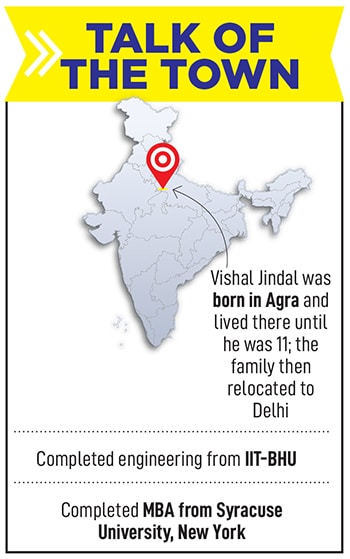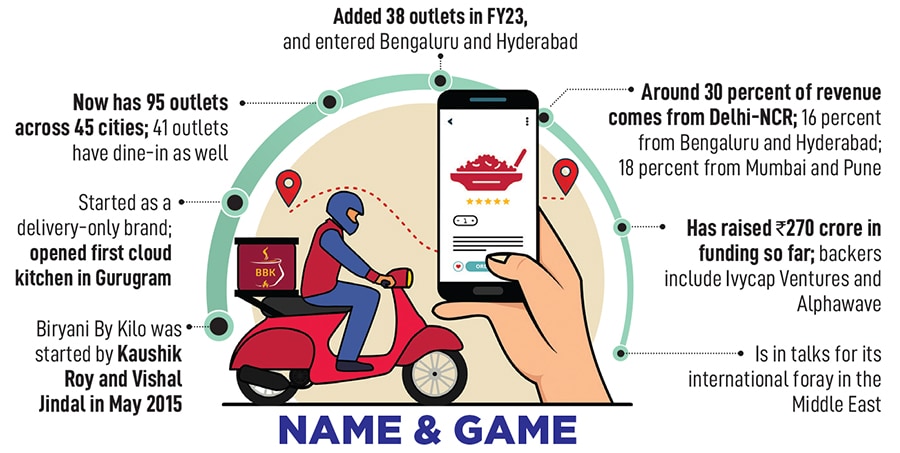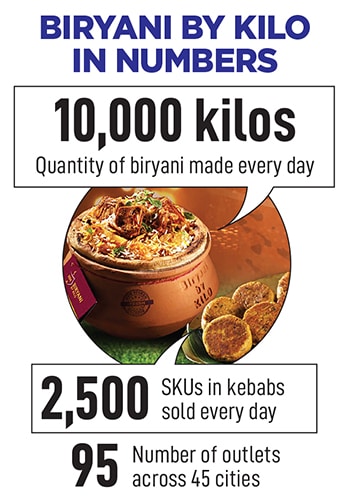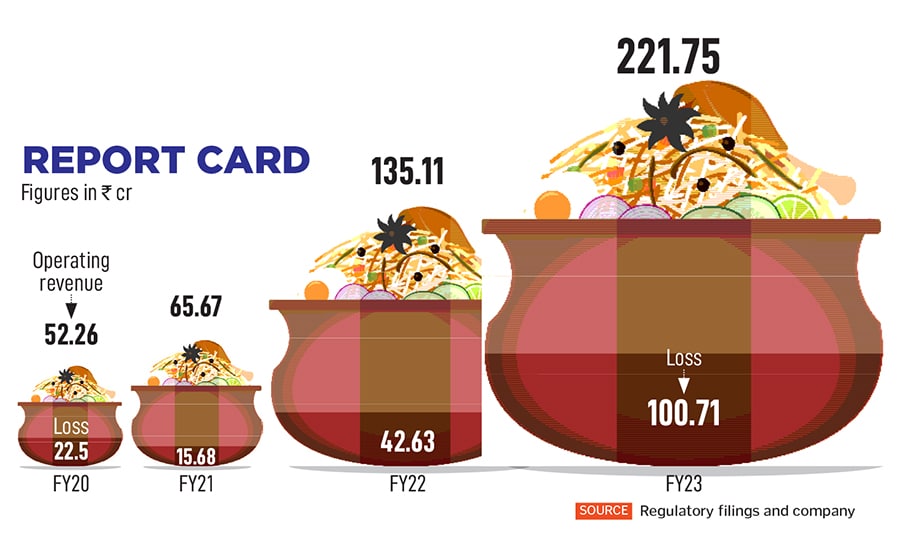How Vishal Jindal is building disruptive Biryani By Kilo into a favoured nationa
This Agra native is ambitiously trying to write a multinational biryani story. Can Vishal Jindal get the ingredients right with Biryani By Kilo?


Agra, November 2012. After a gap of four years, Vishal Jindal was back in his hometown. There was a nip in the evening air and the brightly lit bylanes of Sadar Bazaar were packed with foodies. The hedge fund investor, who had been born in Agra and completed his schooling from the land of the Taj and then went on to study engineering from IIT-BHU, was one of them. As he was busy relishing his kebabs and tandoori chicken, a thought struck the investor who had moved to Singapore and had a significant exposure to food and beverage companies in his Asia portfolio.
Agra, he thought, was known across the country for a slew of delicacies such as petha and jalebi. “There are local players. But can there be a national brand?" he wondered. “And why can’t a multinational brand be built out of a local cuisine?" he pondered.
The captivating taste, and the thought lingered in the investor’s mind over the next few years. If McDonald’s and Domino’s can appeal to the palate of Indians—and make it big—then why can’t the success be replicated by a local food brand… the innocuous thought tormented him for months. The years went by, Jindal shifted from the hedge fund to a private equity (PE) firm in India, made zero investments in any food business, but started investing time in interacting with a diverse army of F&B experts across the country. His quest was to find out the secret ingredients that would make a brand out of a local food commodity. “I somehow was never comfortable with the investment career," he confesses. “I was always a founder."
 And indeed Jindal was a founder to begin with. The second-generation entrepreneur who worked in the US for a year after completing his MBA, came back to India in 1996 and started an electronics trading company along with his brother. The duo used to import high-value added equipment from the US, Europe, China and Taiwan, and supply it to a bunch of companies such as IBM, Compaq and HP. “We were their preferred vendors," he claims. The business went on for close to a decade, Jindal lost interest due to a constant dip in the profit margins and the realisation that he had morphed into a trader rather than a founder. The thought of building something of his own was always buzzing at the back of his mind.
And indeed Jindal was a founder to begin with. The second-generation entrepreneur who worked in the US for a year after completing his MBA, came back to India in 1996 and started an electronics trading company along with his brother. The duo used to import high-value added equipment from the US, Europe, China and Taiwan, and supply it to a bunch of companies such as IBM, Compaq and HP. “We were their preferred vendors," he claims. The business went on for close to a decade, Jindal lost interest due to a constant dip in the profit margins and the realisation that he had morphed into a trader rather than a founder. The thought of building something of his own was always buzzing at the back of his mind.
Now, in early 2015, Jindal was taking a food break. Done with his PE gig, he decided to start his food venture along with Kaushik Roy. The reaction of Jindal’s colleagues and friends was along expected lines when they got to know that he had decided to start a biryani brand. They thought the investor was out of his mind. “Are you relocating to Agra to sell biryani? Who makes biryani in a handi? How big can the business be? It’s a regional dish, and has regional variations. You can’t standardise biryani… these were some of the questions, apprehensions and jibes that the second-time founder with zero experience in the food business was greeted with.
 Scepticism was nothing new for Jindal. In fact, as a young boy he had seen it from close quarters when his father decided to become an entrepreneur. “My grandfather was a lawyer, and nobody had a business background in my family," says Jindal. The business of manufacturing stabilisers, he points out, had its moments of ups and downs but his father navigated them quite well. “He always asked me to live my dream," he says. “There was nothing like the Taj before the Taj was constructed," was his favourite one-liner. “If you can build a business out of your passion, then it’s magical," was his advice.
Scepticism was nothing new for Jindal. In fact, as a young boy he had seen it from close quarters when his father decided to become an entrepreneur. “My grandfather was a lawyer, and nobody had a business background in my family," says Jindal. The business of manufacturing stabilisers, he points out, had its moments of ups and downs but his father navigated them quite well. “He always asked me to live my dream," he says. “There was nothing like the Taj before the Taj was constructed," was his favourite one-liner. “If you can build a business out of your passion, then it’s magical," was his advice.
Third, it was okay to have a strong regional nuance or taste palette for a cuisine—take, for instance, biryani variants like Hyderabadi, Muradabadi, Lucknawi and in Kolkata—but it must have a pan-India appeal. Biryani, without any reservations, outdid every rival cuisine. With all the ingredients in place, Jindal rolled out delivery-first brand Biryani By Kilo in Gurugram in May 2015.
 The first few years were sedate. Biryani By Kilo opened two outlets in 2015, doubled it the next year, and by March 2019, it had 18 outlets and was clocking a monthly revenue of ₹3 crore. With a plan to expand the footprint, Jindal entered into funding talks with a big VC fund. The process got protracted, Jindal was set to run out of money over the next few months, and the prospective funder chickened out at the last moment. “At the eleventh hour, he decided that the market for biryani was not too big to make a bet," says Jindal. Miraculously, in June, IvyCap led a Series A round of $5 million. The next big crisis came in 2020 when Covid threatened to consume the food and hospitality businesses. However, having a delivery-first model in the DNA came to the rescue.
The first few years were sedate. Biryani By Kilo opened two outlets in 2015, doubled it the next year, and by March 2019, it had 18 outlets and was clocking a monthly revenue of ₹3 crore. With a plan to expand the footprint, Jindal entered into funding talks with a big VC fund. The process got protracted, Jindal was set to run out of money over the next few months, and the prospective funder chickened out at the last moment. “At the eleventh hour, he decided that the market for biryani was not too big to make a bet," says Jindal. Miraculously, in June, IvyCap led a Series A round of $5 million. The next big crisis came in 2020 when Covid threatened to consume the food and hospitality businesses. However, having a delivery-first model in the DNA came to the rescue.
Biryani By Kilo, reckon marketing and branding experts, is not the first to build a brand out of biryani, but it is definitely a trailblazer when it comes to building a national brand. “There are strong regional biryani brands across India but they are challenged by their geographical limitations," says Ashita Aggarwal, professor of marketing at SP Jain Institute of Management and Research. Jindal, she contends, has taken an audacious step, and it is still early days for the brand. While having a uniform taste might be a big challenge, the positive side is that it helps it to scale. “They also need to take care of their losses," she sounds a word of caution. From ₹22.5 crore in FY20, the losses have jumped to ₹100.71 crore. During the same period, the revenue has increased from ₹52.26 crore to ₹221.75 crore.

In 2015, foodie Jindal was ready to listen to his passion. “I didn’t select biryani randomly," he maintains, adding that there were a slew of prerequisites that he looked for in a cuisine before taking the plunge. First, the food had to be something that could be easily delivered without losing its flavour. He knew pizzas, burgers and dosas scored poorly on this front. Biryani ticked the box. Second, the food had to be a meal and not a snack. The insight came from his birthplace where he had seen that in spite of the love people had for snacks, there was an unmet craving for a dish that could be filling and fulfilling. Biryani again scored highly.
Also read: iD Fresh Food: Inside PC Musthafa"s dosa-idli batter empire

Jindal, for his part, maintains that he is focusing on bringing down losses and hitting profitability. Jindal explains the reason behind the jump in loss from ₹42.63 crore in FY22 to ₹100.71 in FY23. In FY23, he points out, the brand added 38 outlets. It came on the back of a sizeable number which were added in FY22.
“There was also an increase in marketing and advertising costs because the brand entered the new markets of Bengaluru and Hyderabad," he says. “We are on the path to profitability and you will see that in the FY24 numbers," he claims, adding that his dream is to build a ₹1,000 crore profitable food brand out of India. “We also plan to go overseas," he says. “There are monuments and then there is the Taj. Similarly, there are biryani brands and there is a disruptor in Biryani By Kilo," he signs off.
First Published: Dec 11, 2023, 14:37
Subscribe Now